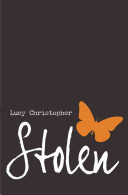
Stolen
Written by Lucy Christopher
New York: Scholastic, 2010, 304 pp.
ISBN: 978-0545170932
A masterpiece first novel for Lucy Christopher, Stolen is a breathtaking story of survival. The story takes the form of a letter from captive to captor, drawing the reader in from the very beginning. It explores the harsh, unforgiving outback of Australia, the will to survive, and the tumultuous, sometimes confusing, relationship between kidnapper and captive.
Gemma, a British sixteen-year-old girl, is traveling with her parents when she meets a vaguely familiar handsome young man during her layover in the Bangkok airport. His captivating blue eyes make it impossible for Gemma to resist, and she quickly becomes smitten. Gemma’s blind attraction and trust is natural, but she will soon regret her initial instincts as this entrancing man becomes her kidnapper. Gemma is horrified when she awakes in a hot little house and learns that her kidnapper, Ty, has spent years watching, planning, and waiting for her to come live with him. He has hopes she will understand his love, love him in return, and accept her new life. Gemma is tested in many ways, as she learns to live in the desert with a man she finds hard to hate, but should. Because of the poetic feel to the landscape and the romanticized image her captor has of her, Gemma slowly accepts what is happening and eventually begins to accept Ty’s love. The conflicting feelings within Gemma are reflected in her letter, which leaves the reader conflicted as well until the very last page. This brilliant piece blurs the boundaries of friend and captor, contempt and love, reality and fantasy.
Christopher creates a novel with a disturbing plot that mirrors the unruly setting. It is beautifully written which conflicts with the reality of the story. Christopher has managed to explore a situation that is usually horrific, and show many more dimensions. The story is a reflection on events that have already happened, which gives the reader insights into Gemma’s emotions, thoughts, confusions, and desperation. The reader is transfixed by the horror of the kidnapping, but finds that they also slowly fall in love with the kidnapper.
Christopher grew up in Australia, spending a lot of her time living, traveling, and working in the bush. She uses her feelings and personal experiences from being in the outback to develop the essence of the setting and to create Gemma and Ty’s characters. More about her life is found at http://www.lucychristopher.com/about. The authenticity of Christopher’s portrayal of the Australian outback is reflected in many ways. She describes the landscape as desolate, baron, hot, and unmapped, which is how many Australians would describe it as well. The animals and plants are native to Australia and that particular region. Brown snakes are prevalent throughout Australia and are feared due to their potent venom; this is the same snake that bites Gemma and ends Ty’s fantasy. Information about Australia’s Outback can be found at http://www.outback-australia-travel-secrets.com/great-sandy-desert.html and at Google books.
Ty is the only character representative of Australia, so does not provide an accurate insight to the peoples of this country. However, Ty does possess characteristics and traits that reflect Australian life and uses words and phrases that are common in Australian’s phraseology.
Books that would complement Stolen’s capture and captive relationship are John Fowles’s The Collector (2006) or Ann Patchett’s Bel Canto (2008). These two highly acclaimed young adult novels address issues of kidnapping and the main characters’ struggles with Stockholm Syndrome.
Cates Harris, Oklahoma State University, Stillwater, OK
WOW Review, Volume IV, Issue 1 by Worlds of Words is licensed under a Creative Commons Attribution-NonCommercial-ShareAlike 4.0 International License. Based on work at https://wowlit.org/on-line-publications/review/iv-1/

Hello,
How I wish I had found this posting before I submitted my changes for the paperback version of Karma! As you can imagine it is not easy to write of Indian culture as a foreigner. All assurances to readers that I did enlist the help of three Indo-Canadian writers for assistance with the language (one writer of HIndu descent and two Sikh-Punjabi writers). Not only did they read for accuracy but also made many of the additions that you refer to as incorrect. Sigh. It is so difficult to get things right. Writing Karma was a very risky undertaking that I spent three years on. To explore both a culture and the dire political situation of 1984 as an outsider was fraught with peril but I was committed to telling this important story. My hope was to bring to light the relatively unknown massacre of the Sikhs to the general community as well as write about the difficulties of immigration, identity and adolescence. It was a work of passion that I am proud of. Many thanks for taking the time to read Karma and offer your thoughts. I learned much for your post. All my best, Cathy Ostlere
Hello Cathy,
Thank you for your gracious response! I thoroughly enjoyed reading the novel and was stunned at the meticulous descriptions of daily life in India, especially considering that your first visit to India was not exactly very pleasurable. India is complex and it is very challenging to view it as a single entity or a single theoretical construct. I admire and applaud your resolve to write a novel about my homeland despite the challenges of being an outsider. And I also applaud your thematic choice for the main plot – the riots following Mrs. Gandhi’s assassination are some of the least known and least discussed topics of Indian politics. I hope you will be writing another such powerful story set in India pretty soon! Warmest regards, Shri Ramakrishnan